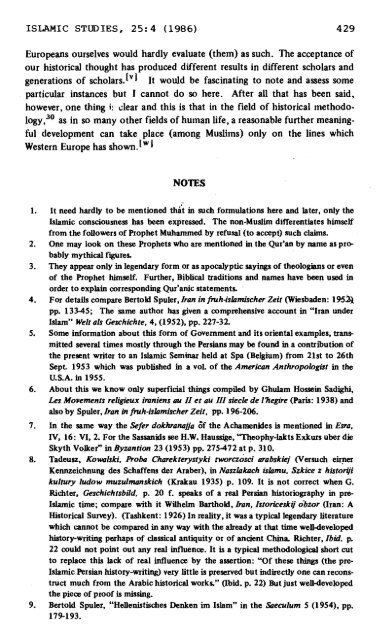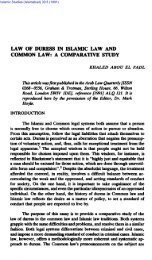ISLAMIC & WESTERN HISTORIOGRAPHY
ISLAMIC & WESTERN HISTORIOGRAPHY
ISLAMIC & WESTERN HISTORIOGRAPHY
You also want an ePaper? Increase the reach of your titles
YUMPU automatically turns print PDFs into web optimized ePapers that Google loves.
<strong>ISLAMIC</strong> STUDIES, 25:4 (1986) 4 29<br />
Europeans ourselves would hardly evaluate (them) as such. The acceptance of<br />
our historical thought has produced different results in different scholars and<br />
generations of scholars.[v1 It would be fascinating to note and assess some<br />
particular instances but I cannot do so here. After all that has been said,<br />
however, one thing i: clear and this is that in the field of historical methodo-<br />
logy.30 as in so many other fields of human life, a reasonable further meaning-<br />
ful development can take place (among Muslims) only on the lines which<br />
Western Europe has shown.[ 1<br />
NOTES<br />
It need hardly to be mentioned thit in inch formulations here and later, only the<br />
Islamic consciousness has been expressed. The non-Muslim differentiates himself<br />
from the followers of Prophet Muhammed by refusal (to accept) such claims.<br />
One may look on these Prophets who are mentioned in the Qur'an by name as pro-<br />
bably mythical figures.<br />
They appear only in legendary form or as apocalyptic sayings of theologians or even<br />
of the Prophet himself. Further, Biblical traditions and names have been used in<br />
order to explain corresponding Qur'anic statements.<br />
For details compare Bertold Spuler, Iran in ftuh-islamischer Zeit (Wiesbaden: I%$<br />
pp. 13345; The same author has given a comprehensive account in "Iran under<br />
Islam" Welt als Ceschichte, 4. (1952). pp. 227-32.<br />
Some information about this form of Government and its oriental examples, trans<br />
mitted several times mostly through the Persians may be found m a contribution of<br />
the present writer to an Islamic Seminar held at Spa (Belgium) from 21st to 26th<br />
Sept 1953 which was published in a vol. of the American Anthropologist in the<br />
U.S.A. in 1955.<br />
About this we know only superficial things compiled by Ghulam Hossein Sadighi.<br />
Les Movements religieux imniens mc II et au 111 siecle de 1 'hegire (Paris: 1938) and<br />
also by Spuler. Iran in ftuh-islamischer Zeit. pp. 196-206.<br />
In the same way the Sefer dokhramjja 6f the Achamenides is mentioned in Esra,<br />
IV, 16: VI, 2. For the Sassanids see H.W. Haussige. "Theophy-lakts Exkurs uber die<br />
Skyth Volker" in Byzantion 23 (1953) pp. 275472 at p. 310.<br />
Tadeusz, Kowlski. Proba Charekterystyki tworczosci mabskiej (Versuch eirner<br />
Kennzeichnung des Schaffens der Araber), in Naszhkach iskrmu. Szkice z historiji<br />
kulrury ludow muzulmanskich (Krakau 1935) p. 109. It is not correct when G.<br />
Richter, Ceschichtsbild, p. 20 f. speaks of a real Persian historiography in pre-<br />
Islamic time; compare with it Wilhelm Barthold. Iran, Istoriceskij 03zor (Iran: A<br />
Historical Survey). gashkent: 1926) In reality, it was a typical legendary literature<br />
which cannot be compared in any way with the already at that time welldeveloped<br />
history-writing perhaps of classical antiquity or of ancient China Richter. Ibid. p.<br />
22 could not point out any real influence. It is a typical methodological short i t<br />
to replace this lack of real influen~ by the assertion: "Of these things (the pre<br />
Islamic Persian history-writing) very little is preserved but indirectly one can reconstruct<br />
much from the Arabic historical works" (Ibid. p. 22) But just welldeveloped<br />
the piece of proof is missing.<br />
Bertold Spuler. "Hellenistisches Denken im Islam" in the Saeculum 5 (1954). pp.<br />
179-193.
















